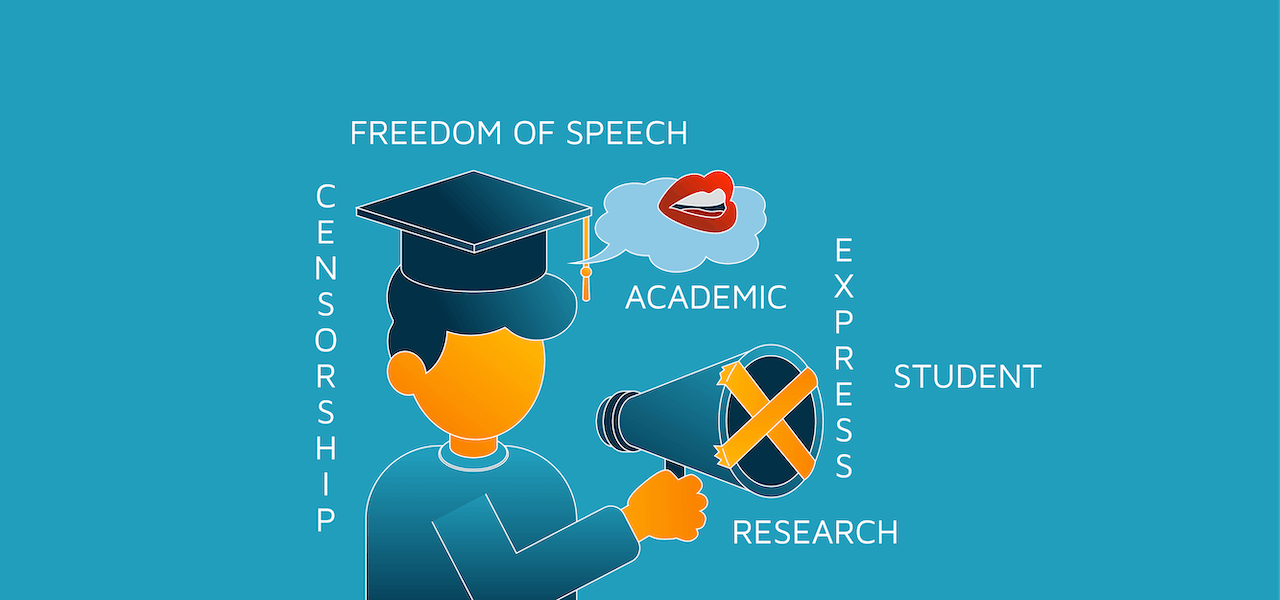If you’ve spent any amount of time around people and social media in the United States since COVID hit and with the current political season, you’ve seen the hot-tempered mindset of some people. While freedom of speech is a Constitutional right, there’s a line that gets crossed sometimes that has those on the receiving end claiming discrimination or demanding that their opinion be heard and agreed with instead.
On academic campuses full of young adults who are in school to learn how to handle differences of opinion respectfully but haven’t quite gotten there yet, this can be a recipe for disaster. Volatile situations crop up when someone’s feelings are hurt or vocal stances become podiums for arguments instead of respectful debates. A tough call has to be made by administrators to prevent outbreaks of violence or mental health issues, and many universities are turning to academic censorship as the only means they have for this defense. The foundational reason for this censorship is to help prevent people from feeling bullied or ostracized and avoid violence and hurt feelings, but it has had consequences that make some learners feel like the only way to get through their school years is to inhibit their own opinions and not express themselves.
The Importance of Freedom of Expression
The United States was founded on the goal of developing freedoms. Over the decades, the focus moved from the specific freedom of religion to the freedom to have our own beliefs and opinions in general. This freedom of expression has allowed us to create beautiful and powerful novels and non-fiction books, movies, artwork, and so much more. The humanities have made major strides because artists can express themselves, and hard science researchers have been able to move forward with gaining knowledge without limits as long as they followed ethics and regulations.
Freedom of expression gives us the liberty to speak our minds, whether others want to hear it or not. But this line often becomes blurred with our “right to speak,” as we forget tact and respect for others’ beliefs in defense of keeping our own freedoms protected. When these disagreements are handled right, they make for forward-moving debates and discussions as policies, written works, and artwork are critiqued and reviewed. Debate is an art that has an integral place in society to keep people free-thinking and using their own minds to form decisions. When debates turn into arguments with one side trying to steamroll the other, though, someone has to step in.
What is Academic Censorship?
The definition of censor means to “suppress or delete” something that is considered to be objectionable. If something is offensive or disturbing or causes a disagreement, it can be censored. In the academic realm, these censored topics usually include social and political issues and focus on limiting access to controversial materials, social media discussions, and other opportunities for arguments to occur.
Censorship in academia often starts with cutting out the use of materials in class that discuss things like religion, race, and sexuality. The problem is that these are the perfect places for instructors to guide students on how to handle differences of opinion if modeled correctly. But pressure for censorship comes from outside sources, parents, politicians, and organizations who disapprove of the topics because they don’t line up with their own values, morals, and belief systems.
Censoring one topic opens a can of worms, though. Offendable ideas become unlimited as people disagree with content brought up in any area and demand the offending topic to be removed from the classroom.
The Results of Censorship on Student Culture
School boards members are constantly finding themselves in touchy situations. They have to make sure they’re following the First Amendment while also meeting standards, upholding the institution’s reputation, respecting everyone’s needs and beliefs, and pleasing students and the community, an extremely difficult balancing act.
For the most part, these decisions of censorship are made by those who want to give students the most sound educational experience, providing an environment in which they can learn while feeling safe. They don’t create rules because of hostility. They truly want to do what’s best for their students.
But when learners feel like their opinions are going to cause controversy or get them in trouble, they begin to censor their own student expression. Frequently on campus today, students feel like they aren’t able to speak their minds, even in written assignments, and can’t engage in political conversations or go against what would be considered “acceptable” by the administration. Even putting their own beliefs on social media is a worry. As students censor themselves, their ability to learn how to handle disagreements in a safe space disappears, and they instead develop the ability to pretend to be someone they aren’t in order to keep the peace. This is not the intention of academic censorship, but it still becomes a consequence that must be addressed.
One Debate Solved: Impactio is the Way to Publish Your Research
No matter what side of a debate you are on, when you perform research, the work must be submitted professionally. This is especially true when the work could be considered controversial. When you use Impactio to put together your final outcome, you have an all-in-one place to get the job done.
With Impactio, publishing your work into professional PDF documents and web pages and connecting with a network of other experts is streamlined and time-saving. Impactio is the preferred program that scholars in all the sciences turn to for their academic needs. When your work might be considered controversial, it’s essential that you cover all your bases, and Impactio helps you get this done right.
